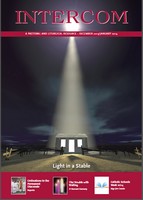 Christmas 2013 issue
Christmas 2013 issue
Click on link to view Intercom Christmas contents
Editorial and Newsletter resources
Feature Article
Catholic Schools Week 2014 (pdf)
Catholic Schools Week 2014
Catholic Schools Week is an occasion to celebrate the work and achievement of our Catholic schools in this country, north and south. It gives us an opportunity to reflect on the values which contribute to the identity of the school and its ethos or characteristic spirit. We take time to say who we are and why we do what we do.
The theme for Catholic Schools Week 2014 is: ‘Catholic Schools – places of faith and learning’. Catholic Schools Week will begin on 26 January 2014 and conclude on 1 February 2014. A national launch of Catholic Schools Week , involving local schools, will take place on Monday 20 January 2014 in St Dominic’s College, Cabra.
Saint Dominic’s College, Cabra, was established in 1835 by the Dominican Sisters. The school is situated off the Navan Road, Dublin 7. Saint Dominic’s has a history of commitment to educational excellence, curriculum innovation and the development of the whole person. Saint Dominic’s motto, ‘Veritas’, epitomises the aim of all Dominican schools and colleges – the pursuit of Truth in all its forms. It acknowledges the unique giftedness of each student and their journey in discovering the truth about themselves, others, the universe they share, and the Creator of all.
Theme for CSW 2014
Catholic Schools – places of faith and learning was chosen as the theme for 2014 to highlight that all learning takes place in a values context. This means that all education involves an education in values; in other words, education is never simply about transmitting simple facts. During CSW Catholic schools will celebrate their identity as Catholic schools. There are five essential elements that give the Catholic school its particular characteristic spirit or ethos.
- The belief that the human person is made in the image of God and is therefore worthy of respect and dignity. Accordingly, Jesus Christ, God made man, is the exemplar par excellence for the Christian person. At all times in Catholic schools, all members of the school community aspire to treat each other in a way that reflects the origin of the human person. All relationships reflect this fundamental belief.
- The belief that we meet God in the ‘bits and pieces’ of everyday life. Our daily interaction is the stuff of our relationship with God. We are approached by God in ordinary life. The sacraments highlight this when the ordinary events of life become a privileged moment for our encounter with God. Also on our part, moments of reflection and prayer are part of ‘the everyday’ when we become conscious of God’s care and love for us and our dependence on him. So liturgy and prayer will be part of the life of the Catholic school.
- The belief that we are saved as a community. We are part of each other and it is together that we become the people of God in the world, the body of Jesus Christ, and the temple of the Holy Spirit, people of ‘a kingdom of justice love and peace’. The main commandment of Jesus is to ‘love God and to love our neighbour as ourselves’. A key element of the Catholic school will be to learn how to live in respect for one another and with a special care for those who have less or are suffering. So part of daily life in the school will be learning how to form a community of care with an eye to those in the world who are in need and or are suffering in any way.
- The fact that we belong to a tradition. Schools form part of the tradition of the Church going back to the saying of Christ: ‘Go teach all nations.’ There is a long tradition of faith-based education in the Catholic Church. The Church has made an enormous contribution to the formation of young people and to society over the years from within the Catholic Christian tradition, from pre-schools through primary, post-primary and third level institutions. In our time it is our duty to be faithful to that tradition and to interpret it anew for the people of this time and for the common good of society.
- The fact that we value knowledge. Knowledge is important to us, to learn about ourselves, each other and the world in which we live. Accordingly, the Catholic school will strive to provide an education of excellence where the acquisition and development of knowledge in all its depth and breadth will be central to the work of the school.
Resources
Resources will be provided to assist schools in celebrating CSW2014. These will be circulated to schools and parishes. The resources will have materials for the home, the parish and the school. A particular element of this year’s resources will be the provision of resources for a diocesan celebration of CSW2014. Intercom and the Furrow will carry resources for the parish Mass.
Television
Archbishop Eamon Martin will celebrate Mass from St Peter’s Parish, Drogheda on 27 January 2014 to mark the beginning of CSW2014. A number of schools will contribute to the liturgy which will be broadcast from the church which houses the relics of St. Oliver Plunkett, patron saint of the Archdiocese of Armagh.
Monsignor James Cassin
Executive Secretary, Council for Education
Intercom
Intercom is a pastoral and liturgical resource magazine published by Veritas, an agency of the Irish Catholic Bishops Commission on Communications.
There are ten issues per year, including double issues for July-August and December-January.
For information on subscribing to Intercom, please contact Ross Delmar (Membership Secretary):
Tel: +353 (0)1 878 8177 Email: [email protected]

